NaNoWriMo and the Art of Eating the Elephant
“How do you eat an elephant? One bite at a time.”

Writing a novel is a massive undertaking. Whether you’re a planner, a flying-by-the-seat-of-your-pants-er, or somewhere in between, it takes a vast measure of passion, time and commitment to get all the way from Page One to ‘The End’. It feels as though there’s endless advice on how to start writing, how to edit, and how to improve – Kurt Vonnegut said “Find a subject you care about and which you in your heart feel others should care about;” Stephen King advises to “write as truthfully as you can […] one word at a time,” and of course there’s William Faulkner’s ever-present call to “kill your darlings!”
The consensus is that only way to be a writer is to write – unfortunately that’s often the most difficult part. As Ursula K Le Guin pointed out, “it takes quite a lot of vigour and stamina to write a story, and a huge amount to write a novel,” and she’s right. 50,000 words? 180,000 words? These are huge numbers and can easily seem insurmountable, especially when you’re up against writer’s block, self-doubt, lack of time, or that awful blank page we all face at the beginning of a new writing journey.
Enter NaNoWriMo.
What is NaNoWriMo and How Does it Work?
National Novel Writing Month (shortened to NaNoWriMo by creators and participants alike) began as a challenge: to write 50,000 words over 30 days. Since that first November in 1999, the project has grown and developed into a non-profit organisation that runs challenges, talks and forums with the aim of helping creatives tell their stories. In their own words, “NaNoWriMo believes in the transformational power of creativity. We provide the structure, community, and encouragement to help people find their voices, achieve creative goals, and build new worlds—on and off the page.” The NaNo website, its home base, is active year-round, but the peak activity comes each November when thousands of people sign up to write those magical 1,667 words each day, with the common goal of hitting 50k by midnight of the 30th.
The core of the NaNoWriMo site, and one of the things that makes it so fantastic to use, is its word count tracker. As they put it, “NaNoWriMo tracks words for writers like Fitbit tracks steps”. You create a project on your account, and every day you can log how many words you wrote towards it. The website tracks your progress against your objectives: how many words you wrote, and how many you have left in order to reach your goal. You can change the display to show your stats as a chart, as a cumulative word count per project, or just your daily count. The site also keeps track of your lifetime word count: how many words you’ve logged across all your projects. Seeing that number grow is a fantastic feeling.
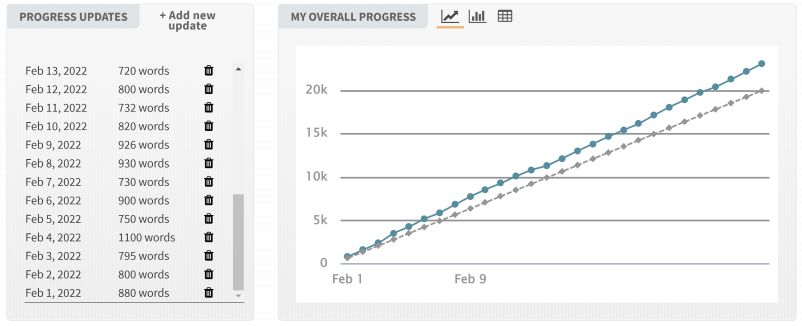
One of the most useful elements of NaNoWriMo is that it lets you set your own goals. You can set your own goals and time periods and have multiple projects running at once. If you want to write 20,000 words over two months, or 100,000 in 10 days, you’re welcome to set it up that way. The tracker will adjust accordingly, giving you the daily goal that will get you there bite-by-bite. The site also keeps your motivation up with progress badges for milestones like writing your first 10,000 words, writing 14 days in a row, or writing your goal number every day of the month.
It’s a great network for writers of all experience levels to find their process and kick their writing habit into gear.
NaNoWriMo has also expanded to include community forums and events. These forums are open for discussions about the writing process, and can help you make writing buddies to keep your motivated. During events there are also local, national and international write-ins, check-ins, and minority group creative spaces. Various authors have run pep talks and mentor events – past events have had input from authors such as Gene Luen Yang, Roxane Gay, Kacen Callender, John Green, Andy Weir, N. K. Jemisin, and Veronica Roth.
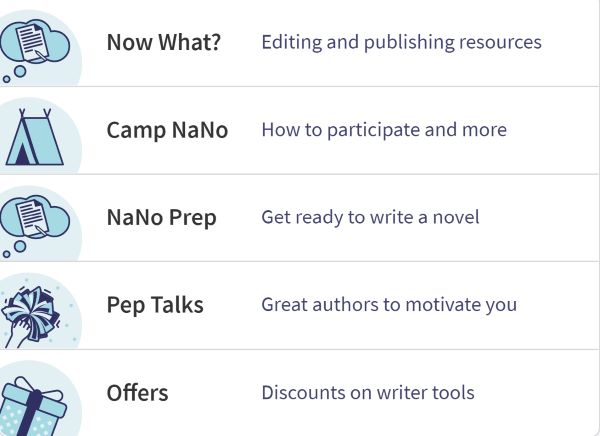
What are the Stats?
In 2017, NaNoWriMo November challenge saw 402,142 participants sign up with a project to complete. In 2018, 295,396. 2019 saw 280,098 writers take on the challenge, and in 2020 the site recorded 383,064 participants. Statistics from these last several years tell us that nearly 4,000,000,000 (four billion!) words are written by NaNo participants every November.
Hundreds of NaNoWriMo novels have been traditionally published, too. Among them are Sara Gruen’s Water for Elephants, Erin Morgenstern’s The Night Circus, Hugh Howey’s Wool, Rainbow Rowell’s Fangirl, Jason Hough’s The Darwin Elevator, and Marissa Meyer’s Cinder.
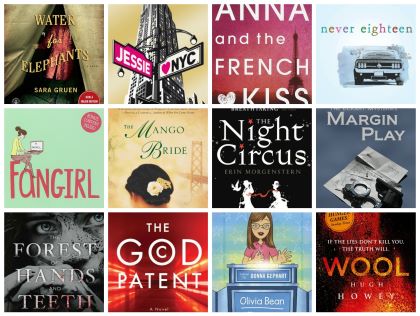
The numbers from NaNoWriMo 2021 haven’t been released yet, but we know that before November even began:
- 427,653 writers participated in the various NaNoWriMo programs, including 90,561 students and educators in the Young Writers Program.
- 842 volunteer Municipal Liaisons guided 671 regions on 6 continents.
- 406 libraries, bookstores, and community centres opened their doors to novelists through the Come Write In program.
- 51,507 people worked on projects during Camp NaNoWriMo in April and July.
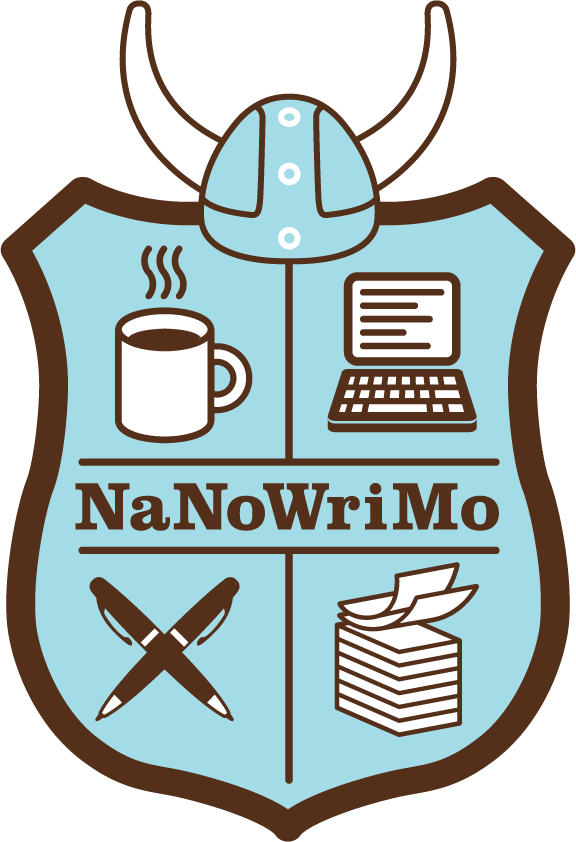
All this isn’t to say that completing NaNoWriMo is easy – it’s still a base goal of 1,667 words every day, and many participants find it difficult to hit that mark. In fact, only an average of 13% of participants “win” the challenge and reach 50,000 words. That’s around 45-50 thousand writers, and those who don’t “win” NaNo still finish with substantial development of their projects, but it’s still not a very encouraging statistic.
Burnout, loss of passion for the project, and feeling inadequate as a writer are the most commonly cited reasons for quitting the NaNo challenge. It’s understandable but unfortunate—after all, the purpose of the challenge is to help writers finish the month feeling encouraged and accomplished.
So what’s the best way to approach NaNoWriMo? Is there a failproof method? Is it worth doing?
Completing NaNoWriMo
You can just dive in on November 1st, but a more sustainable approach might be to try dipping your toes in first – build the habit at your own pace. Camp NaNo is run twice a year (during April & July) and is, as the name suggests, a sort of training camp for the daily writing habit. At the time of writing this article, the July Camp is coming up on the NaNo calendar and I’d encourage you to consider giving it a try – there’s no better time to start than now!
A few ways to prep (for Camp, the November Challenge, or other writing endeavours) are to:
- Figure out how you write (are you a staunch planner, or do you discover as you go?) and account for that – have your plan/resources/playlists/ moodboards ready before the start date so you can hit the ground running with a head full of inspiration.
- Find the time of day that works for you – do you work best early in the morning, during the afternoon, or in the evenings as the day winds down? Decide how you work best, or even just where you have a reasonably consistent time slot to work in, and start building the habit.
- Find a writing buddy (or group). Motivation, consistency and accountability are all exponentially helped by having someone to report back to.
- Remember to take advantage of NaNo’s write-ins and other events – it’s easy to squirrel yourself away when you’re power-focusing on a project, but it can be immensely helpful to stay connected with other writers (even if only at intervals) along the journey.
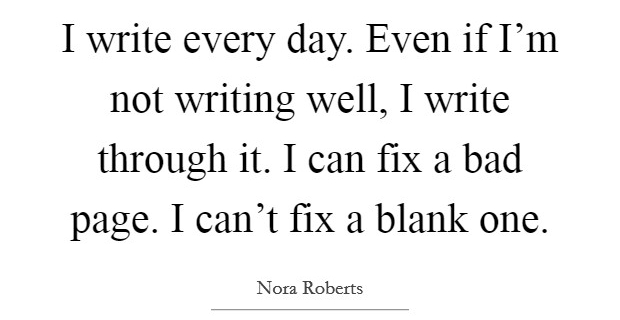
For many writers, I would recommend setting yourself the simple goal of just getting words on the page. The order of the day is quantity over quality. Quality will come with practice, and practice can only come from doing. In the words of Louis L’Amour, “Start writing, no matter what. The water does not flow until the faucet is turned on.”
Our published NaNo authors from earlier have given talks alongside other well known names, and their advice leans in a similar direction:
I think NaNoWriMo is a brilliant idea and gives you two magical things: company and a deadline. Before NaNo I was the sort of person who would write a page and hate it so I’d stop, when really you need to keep going and write more pages and NaNo is a wonderful way to learn that.
Erin Morgenstern, The Night Circus
I can do this. WE can do this. However far behind you are, take comfort in knowing that there is somebody else out there in the same boat, and look for that next fun scene. And then the next. And if that doesn’t work, set someone on fire. In your book, of course.
Sara Gruen, Water for Elephants
Here’s the pep part of my pep talk: Go spit in the face of our inevitable obsolescence and finish your @#$&ng novel.
John Green, The Fault in Our Stars
Make a plan and commit to doing the thing. Even just trying out Camp NaNo can be a gamechanger for people struggling to find a writing habit, and can lead to great new progress. For me personally, the key was finding the right strategy. When a friend and I decided to try Camp Nano for the first time we found our rhythm doing daily write-ins – setting synced 20-minute timers and doing writing sprints together, messaging each other between sprints to ask about synonyms, dialogue, plot beats, or just to complain about how freaking hard writing can be.
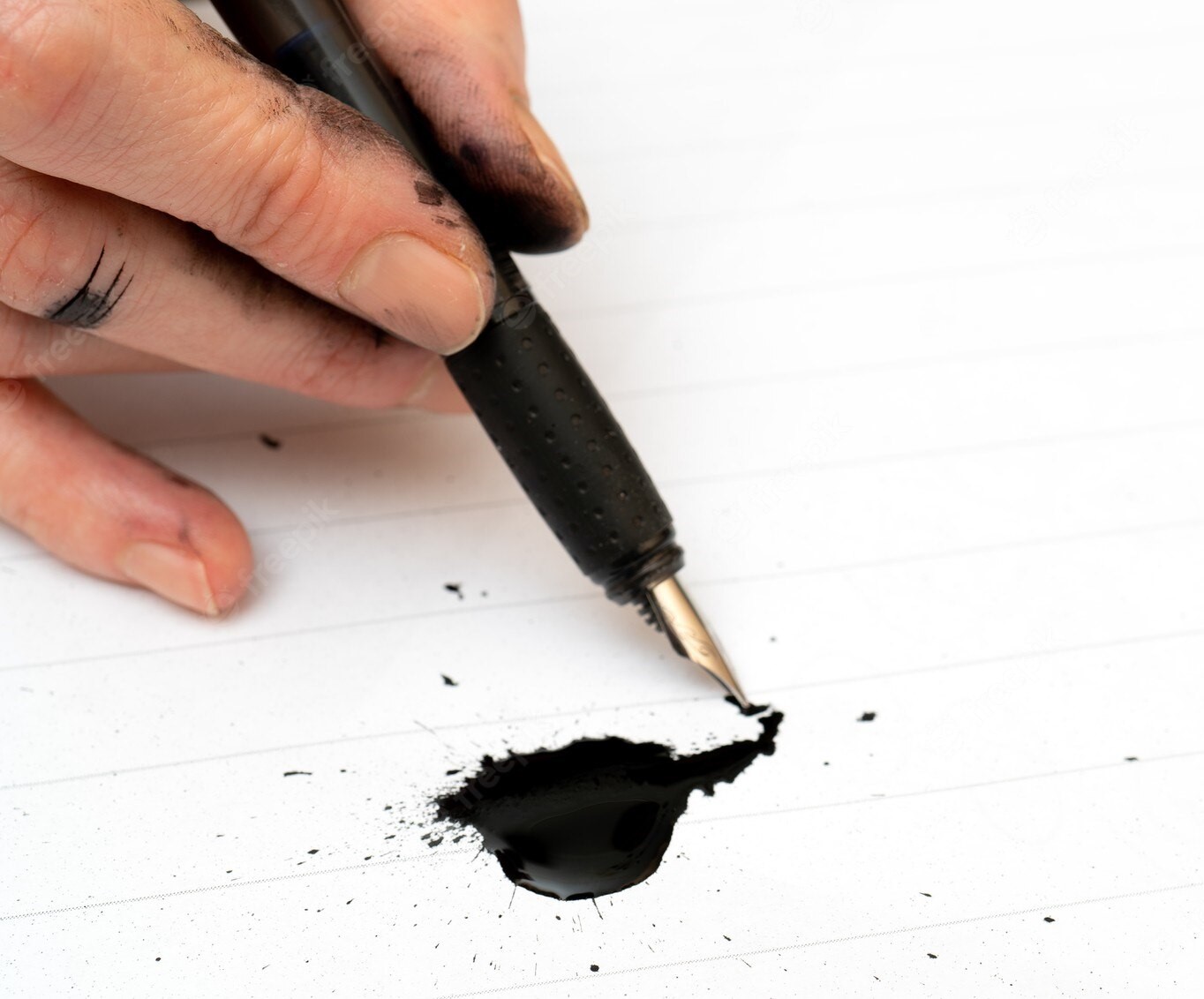
On that note, don’t underestimate the power of writing sprints – it’s surprising how quickly you can write when you put yourself under bursts of focused pressure. Set a 15 or 20 minute timer and see how you go just putting words on the page. It can be the kickstart you need to get your head in the game. It doesn’t matter what goes there, so long as you keep your fingers on the keys for 20 minutes. Sometimes just two 20-minute sprints can get you to your daily goal, and the more you practice getting in the focused mindset, the easier it becomes. The faucet just needs turning on, and all the rusty water a chance to clear out.
For many, the challenge to “write a novel in a month” is too daunting to seem feasible, but that’s why it’s such a good goal to work towards. Commit to writing daily for one month—decide on a goal, chisel out an hour in your schedule, and make it happen. The short timeframe makes us less likely to feel burnt out midway through, and even completing half of the November challenge leaves you with 25,000 words to move forward with. The NaNo structure encourages us to write those words, no matter how imperfect they might be.
Is NaNoWriMo for me?
Something to keep in mind is that your NaNo writing project can be pretty much anything – a novel, a memoir, fanfiction, a research project, a script for stage or screen. As long as it’s word-based, NaNo can help you sit down and get it written.
It can also be eye-opening for writers whose projects tend to peter out after a few months or a few thousand words. Some projects aren’t ready to be written yet, and sitting down to write them is the first step towards recognising that. Only the flip side, some projects are over-baked in our minds, and we get so nervous about them not being good enough that we never actually write them. In both these cases, the best way forwards is to just start. If a project doesn’t have enough steam to reach 50,000 words, you’ll know pretty soon. If a project has been your baby for a long time now, this is the moment to start actually writing it – there’s no other way to do it. One of my favourite sayings is that “you can’t edit an empty page”; even if a project isn’t turning out the way you imagined it, very often the only way to improve is to get it written and then get to tinkering.
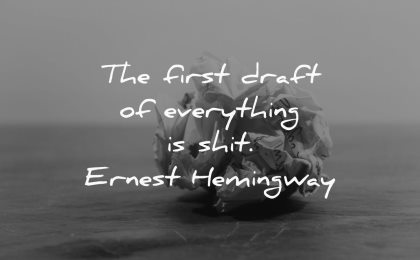
Finally, keep this in mind: The final NaNo goal of 50k in a month just may not be for you. Some people just need to tap out after 500 or 1000 words in a day—no better or worse than someone who writes 3000! Everyone works differently, and habitual effort is the only way to improve (whether it be quality, efficiency or word count; everything takes practice). Writing 700 words a day will net you around 21 thousand words in a month, which is a really good goal to start building up a body of work. Slow and steady can be a great way to go, especially when first starting out or easing back into the habit. Remember, you never have to associate your project with the official NaNo events – decide for yourself how you want to utilise the tracker. The NaNo website is for you to use however works best for you. Start small and work your way up, or just throw down the 50k gauntlet and see how far you can make it.
In the words of Stephen King, “Try any goddamn thing you like, no matter how boringly normal or outrageous. If it works, fine. If it doesn’t, toss it.” In the end, the NaNo approach might not be for you, but it’s absolutely worth taking the time to try.

Margaret Atwood says, “A word after a word after a word is power.” Neil Gaiman agrees: “This is how you do it: you sit down at the keyboard and you put one word after another until it’s done. It’s that easy, and that hard.”
The more we practice, the easier words come. Whether you’re a beginner, a practiced pro, or an long-absent lover of words returning to a set-aside craft, it seems like the secret is just to keep writing. To come back to L’Amour’s faucet analogy, it’s about making the decision to get the water—the words—flowing. That comes with time, patience and fortitude. Let yourself write the terrible, nonsensical, one-star words. Read a lot: broaden your vocabulary, expand the way you think about stringing words together, and let yourself experiment with replicating the styles of authors you love. The words will come flowing from that faucet with less and less difficulty, and eventually you’ll find that they become better, too.
I particularly love this quote from Ursula K. Le Guin:
Once in a while, none of that sweat and trial and error and risk-taking is necessary. Something just comes to you as you write. You write it down, it’s there, it’s really good. You look at it unbelieving. Did I do that? I think that kind of gift mostly comes as the pay-off for trying, patiently, repeatedly, to make something well.
So what is the best way to write? How do we tackle that elephant of a passion project and finally get those words out of our heads and onto the page? NaNoWriMo’s answer is the same as King’s, Atwood’s and Gaiman’s: one word, one bite, at a time.
What do you think? Leave a comment.











I’ve seen my writing improve dramatically over the last few years due to this.
The first time I took part in it (in 2006) I had done a lesser challenge that February, writing 1,000 words a day, which made me believe I might be able to get to 50,000 with just a little more effort.
I had read lots of books about writing before then and written a few complete novels (quite slowly) but it was NaNoWriMo that gave my writing a huge boost.
I wrote a nanowrimo novel in 2015 and while it is 50,000 words of absolute rubbish, it did give me that experience of getting the quantity down on paper to a deadline. My local nanowrimo regional group accepted me as their own and I learned so much from my peers as we wrote together. I am a carer with mental health issues so Nanowrimo broke the spell that had held me for years; the fear that I didn’t have anything of value to write.
I had never heard of this (NaNoWriMo), and my experience of writing is varied. Self-publishing (on Amazon, the only one I have tried) still favours established authors unless you want to give them money to promote your stuff with the vague idea you might get your money back while making Jeff even richer. Royalties are peanuts, reviews are sometime prejudiced and bitter (I had one supposed review less than an hour after a novel of 70K words went online!) saying more about the “reviewer”. I have written in fits and starts and in different ways. I wrote two so far during lockdown, one in about six weeks, the other didn’t take much longer. I have not written a word in two months. I read a while ago that some author said to try to write 1000 words a day. Everybody is different, and works differently, but I applaud the stimulus even if it won’t work for me.
The royalties will be decent if you sell enough books, no?
I definitely don’t write every day after completing Nanowrimo a couple of years ago. In fact it showed me I was far more a poet short story type than a novelist. That said, I learned a lot about how other people plan, build worlds, develop characters and push through boredom or anxiety to finish a project.
The real value of taking part is that it might get you into the habit of writing (or trying to write) every day. There’s no other way to finish a book (especially if you have a day job).
I wish there was a way for NaNoWriMo to incorporate some of the monthly challenge into outlining or character building in addition to writing. I’ve tried to do it a few times and without an idea of an overall arc it fizzled. I was too focused on getting words down than creating an actual story that made sense.
I’m setting myself two concurrent challenges this November, drafting in real time a deeply personal memoir about one man’s struggle, in the face of familial abuse and ridicule, to grow a moustache.
You could call it “My Stubble”.
I find I am usually writing at least that number of words each day, but mainly in emails. If I stitch all my emails together perhaps I can complete a book…
50,000 words in two years is about my level, although I admire those who can knock out that many words in four weeks.
A crime fiction editor I know says she divides her authors into plotters and pantsers – the plotters work out the whole thing in detail, chapter by chapter, the clues and red herrings etc, before they start the first draft; while the pantsers just set off with little advance sense of plot and pace, and write by the seat of their pants, quickly but with lots of backtracking and rewriting.
NaNoWriMo is a great idea, but it won’t work for everyone. That’s no reason to knock it. However one writes, one can always use a bit of a nudge.
My publisher’s from Madagascar – hates this whole idea. It’s an anti-NaNoWriMo thing.
I just have fun with it, write self-indulgent rubbish and don’t ever expect to show my November writings to anyone else. I’ve finished every year since I stopped being so damn precious about it. Wheee!
Hmm… I think the world needs more readers, not writers. There are already more good books out there than anyone has time to read. Having said that, NaNoWriMo is good for teaching readers what writers go through. I did it, and it taught me that I’m not writer material after all!
At least, after later finishing the book, I was smart enough to realize that it was terrible. The only thing worse than people who mistakenly think they can write is people who mistakenly think they can sing.
My challenge is to get through the month by not only writing 1667 words a day but also, resolutely, not to open any of the mails they send or participate in any of the other nonsense. This is inspiring in its own way.
I’ve taken part in Nanowrimo for the last two years and it is an excellent way of getting the words out of my head and on to the screen. I think I’ll be too busy this year to have another go but then I managed the 50,000 word last *and* got married and went on honeymoon in the same month.
I know a few people who have done NanNoWriMo, and have found it motivating, but it’s not for me; I am happier writing 200 publishable words in a day than 2000 unpublishable ones.
A lot of my friends who do this seem to end up rewriting so extensively after the month I wonder if it would be better to spend a month planning then two months, say, writing what you wanted to write the first time.
Then again everyone works in different ways; it was the same with uni essays, some people planned and planned, some wrote in full then edited.
Great idea – I’m up for it! Every writer has a certain amount of garbage to clear out of their system and this is the ideal way to do it, safe in the knowledge that 1000s of sriters are batling through the same process.
I once managed 75,000 words in 36 days. It hurt my brain.
The nearest that I got to it was trying to read a novel in a month… still trying…
I’ve tried it twice now and failed both times. It is a great idea and good fun to have a go at.
It’s really just an excuse to go mad on the keyboard for a month and not worry about it being rubbish.
Very few people write a readable (marketable, accepted by a publisher) book the first time around, and those who do provide the rest of us with inspiration and a glimmer of hope that we too might one day make the grade. In the meantime, as my piano teacher used to admonish, “practice makes perfect”. I hope it does, anyway!
I’ve done it twice too. Succeeded the second time. I enjoyed the challenge but I’d rather do quality than quantity.
I think that NaNoWroMo is a good way of encouraging people to unleash their inner novelist.
You really have to do lots of research to produce excellent writing. Commitment to carry a full time job and find the time to put fingers to keys. Its all in the detail. If a celeb pics up your published work and endorses. Well… that would be a boost.
That depends entirely on your subject or genre. If, for instance, I wrote a love story set in 1980s South London I wouldn’t have to do one jot of research because I lived it.
NB: I have absolutely no intention of writing a love story set in 1980s South London (not that anyone cares; just sayin’).
This reminds me of a rather depressing trend that I’ve become aware of in the freelance writing marketplace where writers are asked to produce, say, a dozen articles of 600 words on a particular subject, which the client then sticks on a website to maximise ‘SEO’ (search engine optimisation).
The rates of pay are abysmal, unless you are extremely fast and don’t care how it reads. Obviously you have to pepper the text with the right key words, which makes the text contrived and mechanical. This ensures that the web is stuffed to the gills with badly written crap which must be hacked through to try and find the information that is worth a damn, just so someone’s page rank is improved.
Quantity and speed over quality and originality.
50,000 in about 5 years. I’m on fiiiiiire.
I thought Philip K. Dick used to do this most of the time. All you need is a shitload of amphetamines and the alimony requirements of about five ex-wives.
The only drawbacks are getting zapped by a pink beam of cosmic religious wisdom and croaking at the age of 53 via a stroke. So, er, count me in…..
Dick is a major writer. Does not deserve to be compared to these kind of experiments.
I’ve written 1000 comments on here in four years. I’m not sure that’s quick enough.
The only problem with NaNo is when people think they’ve written a more or less presentable draft by the end of it. Even if you’re an outliner who has the whole story sussed before putting in any wordcount, you still won’t have a presentable draft come December.
I’m definitely NOT an outliner. Any attempt at forward planning leads to a mental block for me. My NaNo efforts have therefore been pretty much make-it-up-as-you-go-along. This leads to a very messy and illogical draft, but it does at least generate ideas and characters and storylines that you can work with later. That’s what NaNo does for me – it’s about a process of discovery. It’s not a first draft I end up with – it’s a discovery draft.
I’m just coming to the end of my third NaNo, and it has taken that long to get to the end of this particular story – now I will have 150,000 words of insane, illogical, patchily-written novel to try and knock into shape. It’s going to be a tough job, but I’m looking forward to it. Before doing NaNo, the most I’d ever written was around 30,000 words, plodding along at 500 words a day. At that point the story had lost all sense of direction and run out of steam, and I’d lost all faith in the project. This doesn’t seem to happen with NaNo. Writing fast and to a deadline makes you blast your way through until the story’s done, and gives you a better sense of the overall shape of the narrative. You don’t get bogged down in details; that’s for the next draft.
The other great thing about NaNo is that it’s only for a month. This is what you tell your family, so you can get away with having a routine focused around writing, if only for a few weeks. It takes me roughly 2 hours to reach the daily word count – normally one hour first thing in the morning (5 o’clock, anyone?), a half hour over lunch break and another half hour in the evening. Over a short period this is manageable, even if like me you’re out at work for 11 hours of the day. Even then, I still generally need to build in a few days of annual leave, to catch up in the middle, and near the end. I think maintaining a routine is one of the most important keys to successful writing – but it’s one of the hardest things to achieve for most of us.
So, to sum up: Does NaNo produce masterpieces? No – at least, not without a lot more work. Does it help people develop ideas, and enable them to get stuff done that they wouldn’t otherwise find time for? Absolutely.
How to write a (crap) novel in a month.
Having dabbled in writing a couple of novels, the best advice I have seen is ‘ Create some characters and then follow them around until they do something interesting’ . Worked for me the writer, whether it works for the readers that’s for someone else to judge.
There should be a competition for the best 5 word novel.
There are many, actually. And they are called “micro stories.”
I bet there’s a website or app that will churn out a 50,000 word novel for you automatically.
It would probably be better than my own effort. Given that nobody is going to read the thing either way it seems like a sensible option.
Writing is fun and I’d not stop anyone trying. If that’s the motivation that works for them, good on them.
30 days writing like this does sound pretty exhausting, sounds like someone is doing a mini-pilot on the infinite number of monkeys thing, to see if they can at least produce a line of Shakespeare if not the Complete Works.
But that said, it could be interesting to do this, just write and write and write and stop fussing, fidgeting and overthinking. I think there are some people who could get into this as a way of hacking through to a new level. Hmmm there’s almost a novel in that…
But a whole lot more who will churn out a literal, literary, zombie apocalypse.
But all in I quite like the experiment as ‘a thing’. It might just liberate the odd inhibited genius and for writers on the path it could be very illuminating not just in terms of their style and quality but in their approach to the physical, practical aspects of writing long-term.
As any novelist will tell you, any novel *is* work – LOTS of work – before it becomes a cultural artefact. And that’s what you focus on while you are writing it: the work, not the in-the-distant-future impact. If you do that, then it can only end in disaster.
I didn’t know I could write before I had a go at NaNoWriMo five years ago. With a year’s editing, my second attempt was published in eight languages. and now my fourth published novel is out in the UK next year. For me, writing at speed really works, really helps clear all the obstacles to getting my stories out (self doubt and crushing inner critics in my case).
You’ve got to start somewhere. Writing doesn’t come god-given – there is an element of craft that can only be learned by doing the thing. And yes, the resultant wordage after 30 days is a crap novel which should only be seen by you, from behind your fingers (I call it draft zero). But then the real work begins. All writing is rewriting. Hemingway said he wrote one page of masterpiece to ninety eight pages of shit (and added that he tried to put the shit in the wastebasket).
Also, many people do NaNoWriMo just for the sheer fun and achievement. Like perhaps running a marathon, or climbing a mountain, or reading the Complete Works, or painting a landscape. And why the hell not? Is it really so solipsistic? Haven’t we always wanted to tell stories?
I think anything that encourages to people to be creative, to spend time thinking about the world (even if it is shit) is a good thing. No harm done here, only people grasping to express themselves. It’s easy to take the piss, especially as a writer, but really is it better that people do this than not?
I’ve attempted NaNoWriMo a few times and unfortunately have never “won.” I thought my problem was not getting in the habit of writing every day, but maybe it was more that my ideas weren’t as well-formed as they needed to be going in. “Words on the page” are the most important thing, so maybe next time I’ll use those first few pages to create an outline or character analyses that can later be incorporated into the story.
Thank you for sharing and particularly pointing out that NanoWriMo is about developing your own goals and habits.
I’ve been put off it in the past as I don’t like putting too much word count pressure on myself- I am good at writing drivel when I do that! But the goal of changing habits is good for me 🙂
I must look up NaNoRiMo. Thanks for the tips. It really is practice, isn’t it. It is gettin out the laptop and turning it on, getting past the cat wanting to sit on my chest, and the dog demanding pats, to the place where they are settled on either side of me, and the sun is filtering through the window and I am free to type. I love to write. I love to paint, I love to walk and cook, and eat vegetables… so why do I find myself watching television and eating pizza! Thanks for the reminder.
Great tips and ideas.
The community aspect of NaNoWriMo truly makes the event more bearable. No doubt 50,000 words in 30 days is hard, but I find it’s a bit easier when you connect with others working towards the same goal.
there’s a whole month before November dedicated to prepping yourself to write a whole novel from scratch, it’s called Preptober! The forums are very lively then and it’s really quite fun! I find that a lot of writers use July Camp NaNoWriMo to add more words to their current novels, but many start new projects too. And while we’re talking about finding the best writing time…
I have tried and failed the NaNoWriMo challenge before but after reading this article maybe I’ll give it another chance. An amazing and inspiring read!
It’s crazy to think about how quickly I can read compared to how slowly I write. If there was a reading event like this I bet I could read like 10 novels in a month but trying to write a single novel in a month seems excruciating to me. I’m such a slow writer because I need a couple hours to daydream and stare at the page before I feel in the dreamy state enough to write.
I signed up for NaNoRiMo last year. Didn’t even get a page done. I’ll try again this year. I just don’t have the burning passion to write that story, so until I do have a story to tell I can’t write haha
This seems like an interesting (and hardcore) blend of process- and project-oriented approaches. It would be interesting to know what the longer-term effects are for writers who stick with it.
I have a huge love for the NaNoWriMo tracker, and will use it for every project regardless of whether or not it’s November. It is also a great way of procrastinating – when I find myself updating the tracker every 10 words I know that I need a bit of a break.
I hadn’t heard about NaNoWriMo until I read this article, which not only explained the process clearly but also offered plenty of encouragement and tips. Because, like Nora Roberts, I believe that you can fix a bad page. You can’t fix a blank one. So, thanks. I’m going to give NaNoWriMo a go.
I think disconnecting from a social environment (whether it be twitter or instagram) if you are planning to work on a nanowrimo project is pretty important. We tend to compare and thus feel discouraged if those around us are doing better, working more, or working faster.
I’m sold :). In my calendar NaNoWrimo goes!
Fantastic article! I think this really speaks to the overwhelming pressure writers can feel, but offers a way to break the cycle of procrastination that stumps so many of us. I’m keen to give NaNoWrimo a go after reading this!
Great tips on tackling something so large!
This is such a good explanation of Nanowrimo! I have been looking for a succinct article on this topic and you covered everything. Hoping to give it a try this year!!
As I’m not a fiction writer, I’ve done AcrWiMo for academic writers and this November it’s NonWriMo for nonfiction writers. Finding community is definitely a great outcome for the WriMo practices, even if that community dissolves when November ends.